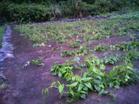|
一、本单元重点单词
1.include vt. 包括;包含
e.g. The price includes postage charges.
价钱包括了邮资。
Our group includes two middle school students.
我们组包括两名中学生。
Your duties will include keeping the house clean and cooking.
你的责任包括保持房间卫生以及做饭。
The plan includes most of your suggestions.
计划包含了你的多数建议。
Many people, including some students, like to use
Mp3 to listen to music.
很多人,包括一些学生喜欢用Mp3听音乐。

比较:
Everyone has to go to the dentist’s, including
you.
Everyone has to go to the dentist’s, you
included.
including 后接名词或代词,在句中作状语。included 为 adj. 是“包括在内的”的意思,用在名词或代词之后。
Ten members were present at the meeting, including
me.
10 个人出席了会议,包括我自己。
Everybody laughed, me included.
大家都笑了,包括我在内。
2.proud adj. 自豪的;高傲的;傲慢的
e.g. I’m proud of our school.(be proud of sth./ stb. )
= I take pride in our school. 我以我们学校为荣。(take pride in…)
He was very proud to tell me that he had taken first prize in
the competition.
他非常自豪地告诉我他在比赛中得了一等奖。(be proud to do sth. )
Tom was/ felt proud that he was chosen monitor of our class.
Tom被选为我们班的班长他感到很自豪。(be/feel proud that-从句)
I was very angry at her proud manner.
对她的傲慢我非常生气。
3.ruin n. 废墟;遗迹;毁灭;崩溃
in ruins 成为废墟;遭到严重破坏
e.g.The old temple is in ruins. 古老庙宇遭到了严重的破坏。
与ruin有关的短语还有:
bring …to ruin 使……毁灭;使……没落
fall in/ into ruin 灭亡;荒废
go/ come to ruin 灭亡;荒芜
e.g.The ship has gone to ruin.
Everything will go to ruin if the secret is let out.
如果秘密泄露出去一切就完了。
vt. 使毁灭;使毁坏
e.g.The flood has ruined all our crops.
洪水毁了我们所有的庄稼。

You will ruin your future if you continue to steal.
如果你继续偷你的将来就完了。
4.end
(1)n. 终点;结束;目的
与end有关的短语:
at the end of 在……末端(尽头)
by the end of 到……末(为止)
come to an end 停止;结束
e.g. Go to the end of the road and turn right.
走到路的尽头然后往右拐。
By the end of last month, we had produced twice as many cars as
we did last year.
截止到上个月末,我们就生产了去年两倍的车子。
By the end of next month, we’ll have finished all our task.
到下个月末我们就已完成了所有的任务。
(2)vi. & vt. 完毕;结束;终止
end up in … 以……的形式或状态结束或告终
end up with 以……结束或告终
e.g.The meeting ended at 5
p.m.
会议在下午5点结束。
You will end up in prison if you continue to steal.
如果你继续偷东西你最终会坐牢的。
He ended his lecture with a poem.
他以一首诗结束了演讲。
The play ended up with the main character’s death.
这部戏以主角的死亡告终。
5.unite v. 联合;团结
e.g.Our town is almost united
with the neighboring town.
England and Scotland united in 1707.
The people united to fight against the flood.
人们团结一心与洪魔作斗争。
United we stand, divided we fall.
团结则存,分裂则亡。
6.damage n.
(1)损失;损害,损坏
The storm did a lot of damage to the crops.
暴风雨使庄稼受到了很大损失。
(2)(前面与the连用)价钱
What are the damage for the wash job of my car?
清洗我的车要多少钱?

(3)(pl) 赔偿费;索赔(to claim damages)
The court awarded £500 in damages to the injured.
法庭判给受伤者500英镑的赔偿费。
vt 损害,损坏;使受损失
The earthquake damaged several buildings.
地震使一些建筑受到了破坏。
7.breath n. 气息;呼吸
e.g. Hold your breath, please. 请屏住呼吸。(hold one’s breath)
I was short of breath after running. 在跑步后我上气不接下气。(be short of
breath)
Please take a deep breath first. 请先进行深呼吸。
When I hurried to school, I was almost out of breath.
当我赶到学校时几乎是上气不接下气。(out of breath )
8.limit vt. 限制;限定 n. 界限;限度
e.g.We must limit the expense
to what we can afford.
I’ll limit my speech to ten minutes.
There is a limit to what I can do for you.
The speed limit here in this street is 30 kilometers an hour.
9.seem v. 似乎;好像……;看起来
e.g.He seems (to be) an honest boy.
She seemed (to be) very happy.
Everybody seems in high spirits.
Look! They seem to be eating something.
He seems to have heard about it.
seem like 看起来像
e.g.The hanging clothes seem like little flags.
It seems/ seemed that …
e.g.It seems that they have heard about it.
It seemed to us that we could never reach the end of the road.
二、本单元重点短语
1.give in (to sb./sth.) 让步;投降(不及物性质的短语动词)
e.g.He has given in to my viewpoints.
I had to give in to my son and bought him a toy.
比较: give up (及物或不及物性质的短语动词)
e.g.Have you given up smoking? 你戒烟了吗?
Don’t give up hope. 别放弃希望!
I gave up my position as a manager last year.
去年我辞去了经理一职。
The police gave up searching for the missing child.
警察放弃了寻找丢失了的孩子。
I give up. Tell me the answer.
我认输了,告诉我答案吧。
2.bring…back to life 使苏醒;使生动;使活泼
e.g.The medicine did bring me back to life.
相关的表达法:
come back to life 复活;复苏
come to oneself 从昏迷中苏醒过来
to the life 栩栩如生
e.g. He painted the horse to the life.
他把那匹马画得栩栩如生。
3.pull down 拆毁;摧毁;推翻
e.g.In order to build a large beautiful square, the government
has decided to pull down all the old buildings there.
During the Cultural Revolution, many old temples were pulled down.
4.put back 放回原处;推迟;拨慢
e.g.After the experiment, please tidy the lab and put everything
back in the cupboards.
Then she put the bicycle back into the yard.
The clock is fast; I’d better put it back five minutes.
5.set up 建立;创立
e.g.We had to set up a tent to
spend the night.
They have just set up a statue in the honor of Ren Changxia.
A new government was set up after the war.
6.more than 超过……;……以上;不止……
e.g.More than one student in our school has won medals in the
mathematics competition.
We have learned more than 3,000 English words so far.
She was more frightened than hurt.
与其说她受伤了,倒不如说受到惊吓了。
no more than = only
e.g.I had no more than five dollars left at the time.
not more than 至多;不超过
e.g.We have not more than fifty students in our class.
三、本单元重难点句子剖析
1.What is being done to protect it?
这个句子中的谓语部分用了现在进行时的被动式:be being done。又如:
The temple is being repaired.
The new hospital in our town is being built now.
We can't move to the new house, it is being painted .
The problem is being discussed in class.
The life of the deer is being studied there.
2.Where there is a river, there is a city. 有河流的地方就有城市。
在这里where是从属连词引导地点状语从句,相当于“介词in/ at/ to + the place + where从句”(定语从句),意思是“在……地方”。又如:
Where there is industry, there is pollution.
Where there is smoke, there is fire.
Where bees are, there is honey.
He lives where the climate is mild.
Go where he tells you to go.
Put the dictionary where it was.
3.Restoring the city and its cultural relics seemed impossible,
but the people of this great city would not give up, “We will not
let our history and culture be destroyed, and we will do everything
we can to save our city!
看来要恢复城市和它的文化遗迹原貌是不可能办的事,但是这座伟大的城市的人民决不肯放弃。“我们将不会让我们的历史被破坏,并且我们会尽我们所能拯救这座城市。”
(1)Restoring the city and its cultural relics 是-ing 动词短语作主语。
(2)... we will do everything we can to save our city! = …
we will do everything that we can do to save our city!在句中,that
we can do是定语从句修饰先行词everything。由于主句中有相同的谓语动词do,因此定语从句中的do可以省略。不定式和can在结构上没有连接关系。因此to不能省去,这样就成了原句。类似的句子还有:I
did all (that) I could to help him. I did what I could to help
him.
文中的句子可以改写为:

4.Strong, proud, and united, the people of St Petersburg are the
modern heroes of Russia .
圣彼得堡人民坚强不屈、充满自豪、团结一致,他们是俄罗斯当代的英雄。
Strong, proud, and united为前置定语,在这里相当于一个非限制性定语从句:
The people of St Petersburg , who are strong, proud, and united,
are the modern heroes of Russia. 当主语比较短时,这类短语常常放在句首。
Helpless, we watched our home destroyed before our eyes.
我们束手无策,只能眼睁睁地看着自己的家园被毁。
- 返回 -
|